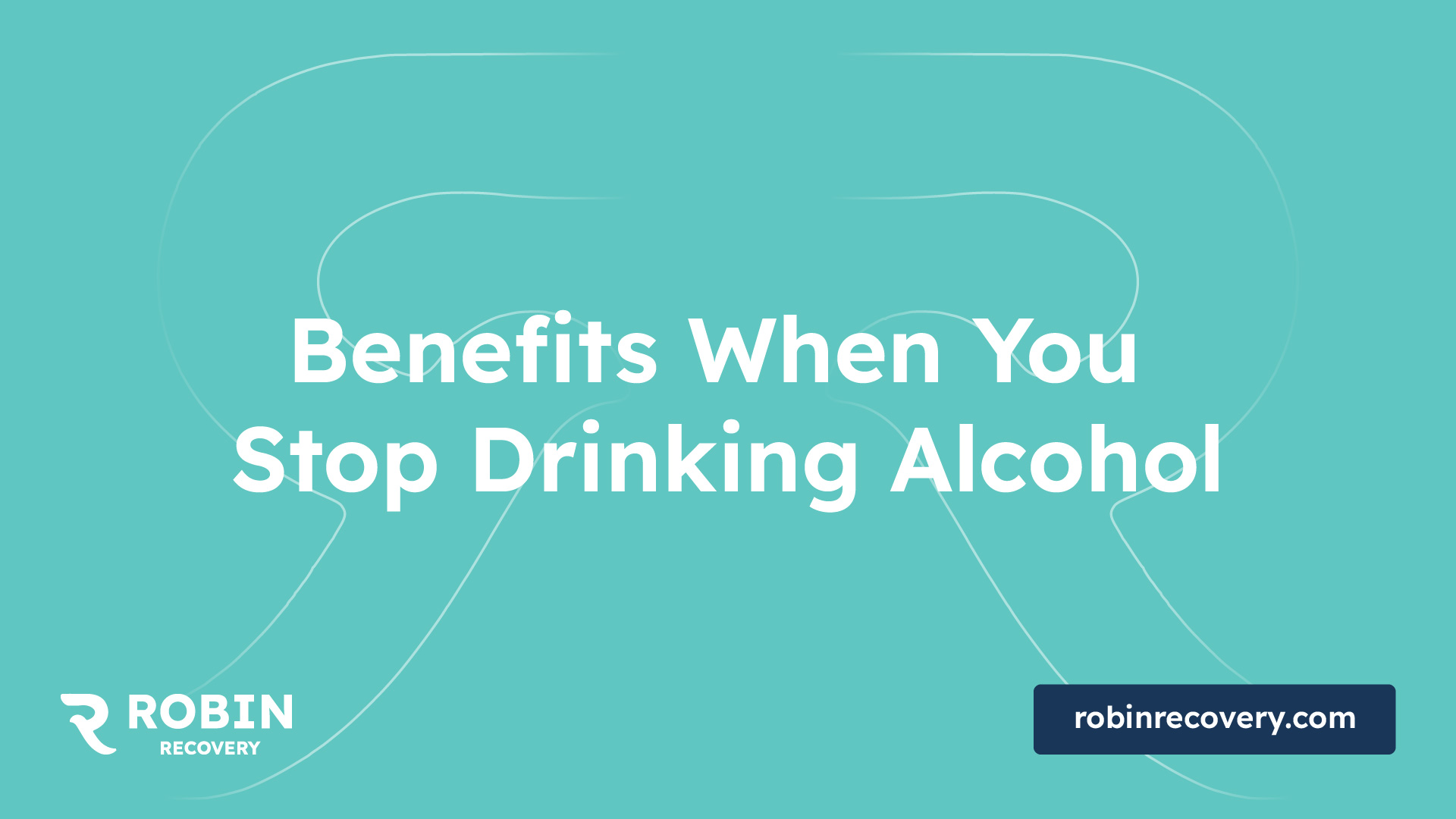Benefits When You Stop Drinking Alcohol

Benefits of Stopping Alcohol
Understanding the benefits when you stop drinking alcohol provides a clear perspective of the transformative impact it can have on an individual's life. The effects of alcohol cessation are both physical and psychological, offering a comprehensive approach to overall well-being.

Physical Benefits
The physical benefits of abstaining from alcohol are numerous and impactful. Research indicates that damage caused by alcohol to vital organs such as the brain, liver, heart, and gut can gradually heal once an individual stops drinking [1]. This healing process can lead to improved physical stamina, endurance, nutrient absorption, and immune system function.
Additionally, the decision to quit drinking can lead to significant improvements in skin health. Skin elasticity can increase, and issues such as redness and discoloration may fade.
Another key physical benefit of quitting alcohol is the potential for weight management. Alcohol is known for its high sugar content and empty calories. By abstaining from it, individuals can better maintain a healthy weight.
Quitting alcohol also greatly decreases the risk of liver cirrhosis, liver damage, certain cancers, and neurological disorders. Ultimately, people who do not drink alcohol experience an improved life expectancy and a more fulfilling and active lifestyle.
Mental Health Benefits
The mental health benefits of stopping alcohol are equally transformative. Following the detoxification process and the subsiding of alcohol withdrawal symptoms, individuals often report feeling better both physically and mentally.
The decision to quit drinking can lead to improved emotional and psychological health, enhancing personal relationships, creativity, and productivity. These mental health improvements can offer a new perspective on life, making sobriety not just a temporary change, but a lifelong journey that greatly improves one's quality of life [2].
Skin Improvement
One of the most visible benefits when you stop drinking alcohol is the improvement in skin health. Alcohol has a dehydrating effect on the body, which can have detrimental effects on the skin. When you quit drinking, the body begins to recover, and the skin starts to regain its natural vitality.
Elasticity Enhancement
Alcohol consumption can lead to skin dehydration, which results in loss of elasticity. When you cease alcohol intake, skin hydration levels improve, and the skin begins to regain its elasticity. Elasticity is crucial as it helps the skin resist wrinkles and maintain its youthful appearance. According to Verywell Mind, quitting alcohol can lead to better-looking skin as it becomes more elastic.
Redness and Discoloration Reduction
Redness and discoloration are common skin issues associated with alcohol consumption. Alcohol dilates the blood vessels in the skin, leading to redness and flushing. Additionally, excessive alcohol intake can result in permanent skin discoloration. However, these issues can be significantly reduced when you stop drinking alcohol. As mentioned in Verywell Mind, the redness and discoloration on your face will slowly fade, leading to a more even and healthy skin tone.
The benefits of quitting alcohol extend beyond skin health, contributing to overall physical and mental well-being. As such, those who choose to quit drinking often experience a significant improvement in their quality of life.
Weight Management
When discussing the benefits when you stop drinking alcohol, one significant advantage is improved weight management. Abstaining from alcohol can lead to a decrease in weight by eliminating empty calories and reducing sugar intake.
Elimination of Empty Calories
Alcoholic beverages are often high in calories but offer little to no nutritional value - these are termed "empty calories". By quitting alcohol, these empty calories are eliminated from the diet, which can significantly aid in maintaining a healthy weight.
For example, binge drinking can lead to consuming an extra 600 calories or more in a day. This excess caloric intake, when not offset by physical activity, can potentially lead to weight gain over time.
By choosing to abstain from alcohol, these additional calories are eliminated, potentially leading to weight loss or improved weight management.
Reduction in Sugar Intake
Additionally, alcohol is often a source of added sugars, which can contribute to weight gain. When alcohol is eliminated from the diet, this source of added sugars is also removed, further aiding in weight management.
Moreover, reducing alcohol consumption can lead to significant savings, which can be a motivating factor for some individuals. These savings can vary based on individual circumstances and goals, and can be tracked using various methods including apps and online calculators.
It's also important to consider the hidden costs associated with drinking, such as taxi fares, buying rounds for friends, and late-night takeaways. These additional expenses should be factored in when calculating total savings from reducing alcohol consumption [3].
In conclusion, the decision to quit alcohol can have a profound impact on weight management, by eliminating empty calories and reducing sugar intake. The financial savings can also serve as an added incentive to maintain an alcohol-free lifestyle.
Nutritional Enhancements
One of the significant benefits when you stop drinking alcohol is the noticeable improvement in nutrition. This is primarily because individuals can focus more on consuming nutritious meals rather than substituting them with alcoholic beverages. Furthermore, sobriety positively affects digestion, nutrient storage, and utilization, leading to a healthier lifestyle.
Focus on Nutritious Meals
Quitting alcohol allows individuals to focus more on having nutritious meals, which is a key aspect of maintaining a healthy lifestyle. Alcohol consumption often leads to skipped meals or poor food choices, contributing to malnutrition. When people quit drinking, they find it easier to plan and consume nutrient-dense meals. This shift towards healthier eating habits not only fuels the body with essential nutrients but also aids in overall health and well-being.
In addition, sobriety enhances physical stamina and endurance, which could potentially lead to increased interest in physical activities, further promoting a healthier lifestyle.
Improved Digestion
The process of digestion is crucial for the absorption, storage, utilization, and excretion of nutrients. Alcohol can adversely affect this process, leading to poor nutrient absorption and, in some cases, malnutrition. However, when individuals stop drinking alcohol, they often notice an improvement in digestion and utility of nutrients [1].
Additionally, quitting alcohol can lead to improved metabolism, which plays a vital role in nutrient utilization and energy production in the body. Improved metabolism, along with better digestion, can contribute to weight management, an aspect that often concerns individuals recovering from alcohol addiction.
Moreover, improved nutrient absorption and digestion can contribute to better immune system functioning, leading to a decreased susceptibility to illnesses. This is yet another compelling reason to consider the numerous benefits when you stop drinking alcohol.
Immunity Boost
One of the most significant benefits when you stop drinking alcohol is the boost to your immune system. Alcohol can hinder the production of white blood cells needed to fight off germs and bacteria. By eliminating alcohol, your body is better equipped to maintain a healthy immune response.
White Blood Cell Production
Chronic alcohol consumption can interfere with your body's ability to produce white blood cells, the primary defense mechanism against harmful pathogens. As stated by Verywell Mind, quitting alcohol improves immunity, allowing your body's immune system to make enough white blood cells to fight off germs and bacteria more effectively. This leads to a reduced risk of infections and a more robust immune system overall.
Better Defense Mechanisms
Apart from promoting the production of white blood cells, quitting alcohol can enhance the overall function of the immune system. Heavy alcohol use weakens the immune system and increases the likelihood of infections. On the other hand, sobriety can lead to fewer illnesses and easier recovery from sickness [1].
According to Aspen Valley Hospital, sobriety enhances physical stamina, endurance, nutrient absorption, metabolism, and immune system function. When not drinking alcohol, the body can absorb more nutrients and metabolism improves. Additionally, the immune system functions better when sober, contributing to a decreased susceptibility to illness.
Quitting alcohol can lead to a significant improvement in your health by strengthening the immune system. This can result in improved health, fewer illnesses, and a better quality of life.
Withdrawal and Recovery
An important part of the journey when you stop drinking alcohol is understanding the process of withdrawal and recovery. It can be a challenging phase, but navigating it successfully can bring about numerous long-term benefits.
Detoxification Process
Once an individual decides to quit alcohol, their body starts to detoxify after about 24 hours without alcohol. This phase can bring about withdrawal symptoms, as the body readjusts to the absence of alcohol Verywell Mind. These symptoms usually subside within a few days but can be more severe for individuals with serious alcohol dependence, requiring medical attention Recovery Kansas City.
Common short-term withdrawal symptoms from alcohol can include:
- Strong cravings
- Mood problems
- Sleep issues
- Hallucinations
These symptoms typically appear within 6 hours of the last drink and peak after a day or two. However, for some individuals, they can persist longer. These symptoms can be managed with medication-assisted treatment (MAT) and therapy, and should be addressed with a doctor if they persist WebMD).
Long-Term Healing
The journey doesn't end with the detoxification process. Some individuals might experience long-term withdrawal symptoms, known as protracted withdrawal. This can persist for months or even years after the short-term withdrawal has passed WebMD).
One common long-term withdrawal symptom from alcohol is trouble sleeping. This can be addressed with cognitive behavioral therapy for insomnia (CBTi), medication, or a referral to a behavioral sleep specialist WebMD).
Despite these challenges, it's important to remember the numerous benefits when you stop drinking alcohol. From physical and mental health improvements to better sleep and improved relationships, quitting alcohol can bring about significant positive changes in one's life. With the right support and treatment, the journey through withdrawal and recovery can lead to a healthier, more fulfilling life.
References
[1]: https://www.verywellmind.com/what-are-the-benefits-of-alcohol-recovery-67761
[2]: https://www.aspenhospital.org/healthy-journey/the-positive-effects-of-sobriety-on-your-health/
[3]: https://www.drinkaware.co.uk/advice-and-support/help-to-reduce-drinking/how-cutting-down-drinking-can-save-you-money
[4]: https://www.recoverykansascity.com/addiction/alcohol/benefits-of-quitting-alcohol/
[5]: https://www.armsacres.com/blog/happen-when-you-quit-drinking
